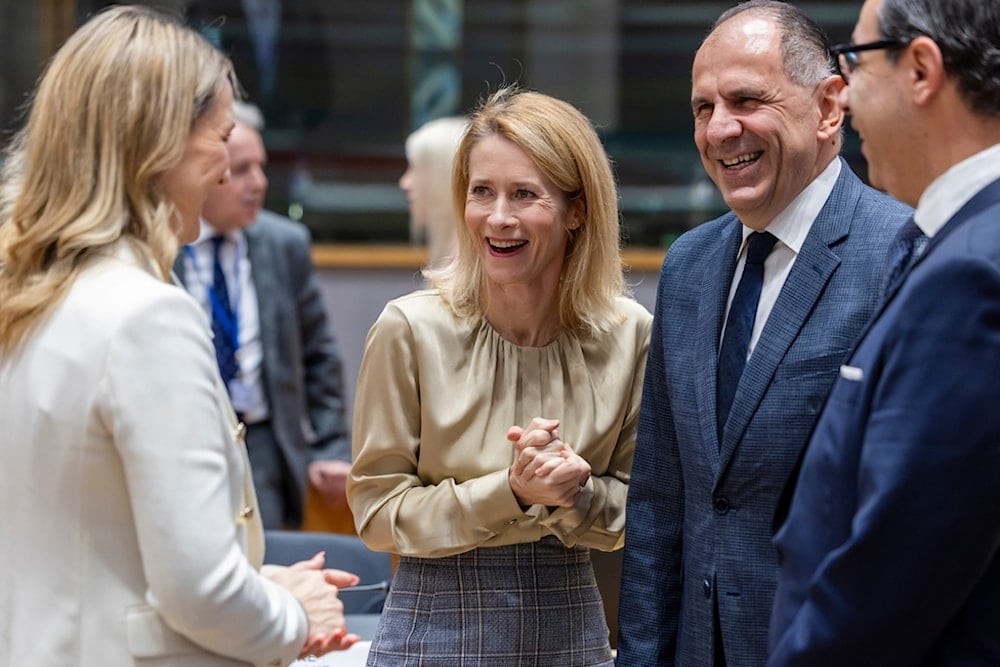Russia warns EU of legal retaliation over bid to give Ukraine assets
Russia warns it will launch legal claims against Belgium and Euroclear and seize assets of “unfriendly states” if the EU uses frozen Russian funds to support Ukraine.
-

European Union foreign policy chief Kaja Kallas, second left, talks with Ireland's Foreign Minister, Greece's Foreign Minister, and Cyprus's Foreign Minister at the European Council building in Brussels, Thursday, November 20, 2025 (AP)
Russia’s State Duma issued its strongest warning yet on Thursday, saying any attempt by the European Union to seize or use frozen Russian sovereign assets will trigger a legal response targeting Belgium and securities depository Euroclear, where most of the funds are held.
Lawmakers described the EU-backed proposal to use Russian assets to support a €140 billion loan for Ukraine as “effectively an illegal seizure of property,” adding that “if implemented, it can be regarded as outright theft.”
The resolution stated that “any attacks on Russian assets must be met with an appropriate legal response, beginning with claims for damages, with a demand for the seizure of assets as a security measure, against Euroclear and Belgium, where the bulk of the illegally frozen sovereign funds are held, in any jurisdiction.”
Billions in frozen funds at the center of dispute
Following the start of the war in Ukraine in 2022, Western countries froze around $300 billion in Russian sovereign assets, most located in Europe. Approximately €185 billion of those funds are currently held by Euroclear in Belgium.
The EU plan aims to avoid outright confiscation, instead issuing loans using profits generated by the frozen securities as they mature. Kiev would be expected to repay the funds only after receiving war reparations from Russia as part of a future peace agreement, something Moscow has already dismissed.
Ukraine has urged rapid approval, saying the financing would help purchase European weapons and sustain its defenses.
Belgium pushes for legal guarantees
The initiative has faced delays due to concerns raised by Belgium, which has demanded assurances that other EU member states will help cover legal risks. Belgian Prime Minister Bart De Wever has also called for frozen Russian assets in other jurisdictions to be included in any joint mechanism.
He argued last month that burden-sharing is essential if Russia sues over the scheme and European institutions are forced to reimburse the funds.
The Kremlin maintains that seizing or using Russian state property will damage trust in the international financial system, undermining confidence in the euro, central bank assets, and the security of investment in Europe.
Russia has already taken over tens of billions of dollars in foreign-owned assets inside the country since 2022, including the Russian operations of French food producer Danone and Danish brewer Carlsberg. Authorities have also diverted foreign funds into so-called type-C accounts, which remain inaccessible unless a waiver is granted.
The Duma resolution noted that “assets of non-residents from unfriendly states may also be used as a source of compensation” if the EU proceeds with the financing plan.
EU weighing risky plan
The European Union is urgently developing a plan to sustain financial and military aid to Ukraine as US support continues to decline and Kiev’s funding needs grow more acute, The New York Times reported in October.
EU leaders debated a politically sensitive proposal focused on Russian state assets frozen since the beginning of the war in Ukraine.
A draft plan by the European Commission outlines using these frozen assets as collateral for a €140 billion ($163 billion) loan to Ukraine. The upcoming summit aims to decide whether to move forward with formalizing the initiative, a process that could take several months.
Referred to by officials as a “reparations loan,” the plan seeks to bridge the growing funding gap, but it carries significant risks, from potential Russian retaliation to concerns over undermining Europe’s standing as a trusted financial center, The New York Times argued.
Open questions and divisions
Key issues still need to be worked out. One major question is how the loan funds would be used. Germany and several other countries want the money directed primarily toward weapons procurement, while Zelensky has suggested that it should also cover essential government spending.
Practical and legal uncertainties persist as well. Belgium wants EU nations to provide collective guarantees to mitigate its exposure, but it remains unclear whether all 27 members would participate, or what form such guarantees would take.
Moreover, Belgium hopes to secure backing from the broader Group of Seven (G7), though Washington’s stance remains uncertain. Another challenge lies in maintaining the freeze itself: under current EU rules, the measure must be renewed periodically, meaning a single Russia-friendly member, such as Hungary, could disrupt the process by blocking an extension.

 4 Min Read
4 Min Read











